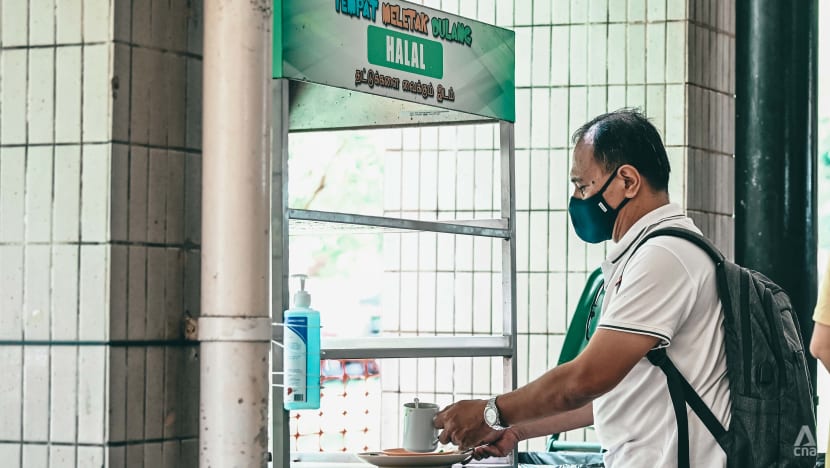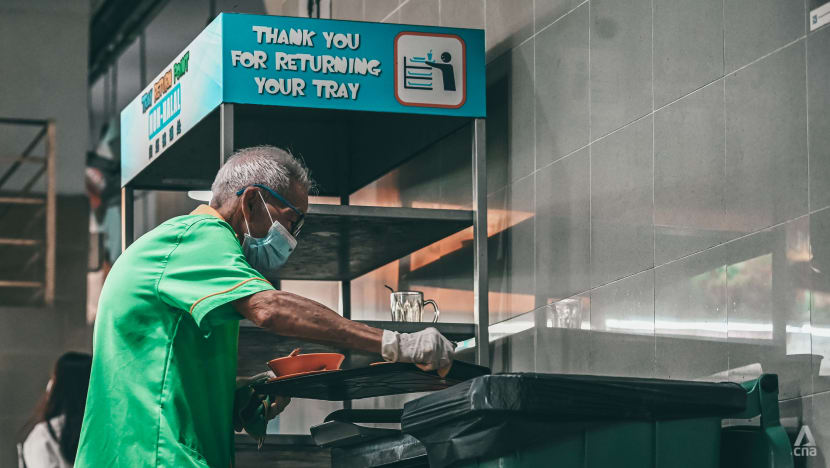1 written warning, no fines issued since enforcement began for diners who do not clear tables: MSE

A diner at Amoy Food Centre helping to clear and return the tray on Sep 1. (Photo: Hanidah Amin)
SINGAPORE: Since enforcement action against table littering in hawker centres began on Sep 1, there has been one written warning issued to a diner for refusing to heed enforcement officers' advice to return dirty crockery.
No fines have been issued thus far.
The enforcement action kicked in after a three-month advisory period.
"Diners have been generally cooperative at our hawker centres, with many taking the initiative to return their trays and dirty crockery after eating or doing so when advised," said Senior Minister of State for Sustainability and the Environment Amy Khor in Parliament on Wednesday (Nov 3).
"The common reason given by diners for not clearing the table after eating is that they had forgotten."
Dr Khor was speaking in response to Member of Parliament Joan Pereira's (PAP-Tanjong Pagar) question on the number of warnings and fines issued under the Clean Tables Campaign.
Under the regulations, diners who don't clear their dirty trays, crockery and litter will first be advised by enforcement officers, added Dr Khor.
If they refuse to heed officers' advice, they will have their particulars taken down and be issued warnings if it is their first offence. Only second or subsequent offenders will be issued fines or sent to court.
Dr Khor added that the Ministry of Sustainability and the Environment (MSE) will continue with "extensive outreach efforts" to ensure people are aware of the requirement to return dirty trays and crockery after dining in public dining spaces.
"This includes multilingual outreach materials on mass media and social media platforms, on-site reminders at hawker centres, coffeeshops and food courts, as well as collaborations with grassroots organisations, schools and youth groups," she said.
From Jan 1, the Singapore Food Agency (SFA) will also be commencing enforcement against table littering at coffeeshops and food courts.
This will follow a two-month advisory period from Nov 1 to Dec 31.

"SELF-SERVICE CONCEPT" MOST SUSTAINABLE
In response to Dr Khor, Ms Pereira asked whether MSE would support the adoption of technology to improve cleanliness in these dining areas, such as deploying tray return robots or automated food waste digesters.
Acknowledging that the cleaning services and waste management sectors are facing a manpower crunch with the ageing population and declining workforce, Dr Khor said the situation is "likely to become more acute".
"Our average age of our cleaners is 60 years today. So the self-service concept ... really is the most sustainable way going forward to maintain the cleanliness and hygiene of public dining spaces, including coffeeshops and food courts," she added.
"In fact, this revised table-cleaning workflow will actually give assurance to our ageing cleaners that their services continue to be needed and appreciated, and also give them better clarity on where to focus on, (and) a safer and better working environment."
Dr Khor said this could help meet manpower constraints with "better retention", and people who are thinking of joining the sector might actually do so.
However, companies are also encouraged to refer to the Environmental Services Industry Transformation map under the National Environment Agency (NEA) to improve productivity, such as by redesigning their workflow or adopting technology, she added.
"(Eligible) NEA-licensed cleaning companies, premise owners, tenants, can actually apply for the Environmental Services Productivity Solutions Grant, which provides funding support for them to ... purchase equipment, cleaning and waste management equipment, such as autonomous cleaning robots and food waste digesters."
















